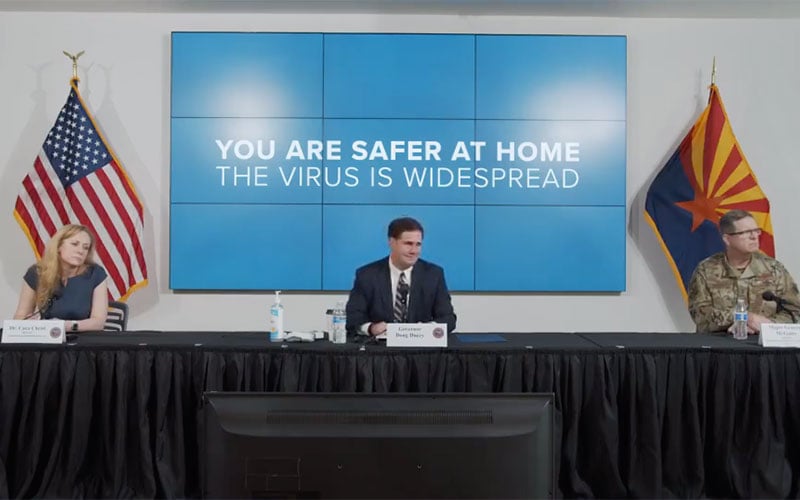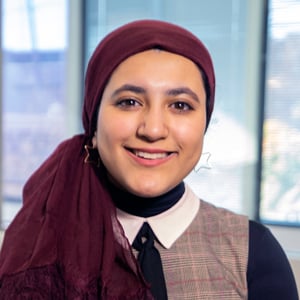
Arizona Gov. Doug Ducey’s executive order calls for a shutdown of bars and movie theaters, delays the start of the school year and prohibits gatherings of 50 or more. It does not, however, call for a statewide mandate for masks. (Photo courtesy of Governor’s Office via YouTube)
PHOENIX – Gov. Doug Ducey on Monday ordered the shutdown of Arizona’s bars, gyms, water parks, movie theaters and river tubing for 30 days. The executive order takes effect at 8 p.m. and lasts through July 27.
“Our expectation is that next week our numbers will be worse, it will take several weeks for the mitigations that we have put in place, and are putting in place, to take effect,” Ducey said in a news conference Monday. “But they will take effect. So, over time, we’ll see reductions and not increases.”
Ducey also announced a delay to the start of the school year, pushing back start dates for in-person instruction until Aug. 17. Ducey noted that the date is “TBD” – short for “to be determined” – because the state is “being vigilant, being flexible and being humble; we’re not guessing.” Schools can choose to begin remote instruction on July 1.
Ducey’s order also called for a statewide prohibition on mass gatherings of 50 people or more and a halt on liquor licenses for special events through July 27.
“Of course our objective is to protect lives and to protect livelihoods, and when in doubt, we’re going to err on the side of protecting lives,” the governor said.
The executive order does not include a statewide mandate for mask use – local leaders have implemented city and county rules to that effect – but Ducey said he will work with state officials to make sure everyone in Arizona can access face coverings by the end of this week. All correctional officers and inmates will have masks, too, he said.
State officials also agreed to implement a crisis standard of care plan after Arizona hospitals called on them to do so to address the lack of essential medical supplies.
The state’s addendum rules, drafted from feedback from hospital leaders, proposed a points-based system to assess patients based on such factors as health conditions, age and survival chances. The plan then would score patients on a color chart: Red means the patient is at highest priority for critical care resources, yellow for immediate priority and blue for lowest priority.
The color-coded rules mean hospitals will prioritize and decide “who gets care, and what care,” Dr. Elizabeth Wilson, an emergency medicine physician for Medlink, told ABC15. “It’s going to be devastating for anybody who’s going to be involved in any of this, but when we have a crucial shortage of resources, that’s why you have to do it, we don’t have a choice.”
Ducey maintains the state’s hospitals are well-equipped with ventilators to handle the COVID-19 pandemic. The Arizona Department of Health reported that 88% of ICU beds and 84% inpatient beds were in use as of Sunday. Ducey issued an executive order in March that gave hospitals a month to plan for increasing ICU capacity by 50%.
The state’s largest hospital system, Banner Health, is among those that are already in surge-planning mode. Banner spokesperson Becky Armendariz told Cronkite News in an email Friday that the Desert campus has converted some of the unused floors in its pediatric hospital to adult units to serve as overflow units for non-COVID-19 patients.
“We have adequate capacity at Banner Desert at this time for COVID-19 and non-COVID-19 patients, and plenty of capacity for pediatric patients,” she said.
Ducey was asked during Monday’s news conference whether the limit on gatherings will apply to churches and political rallies.
“The Constitution remains the supreme law of the land in Arizona,” the Republican governor replied.
The order comes a week after President Donald Trump hosted a rally in the 3,000-seat Dream City Church in north Phoenix, where masks and social distancing were not required. The church later received a cease and desist letter from Arizona’s attorney general and faces allegations of making deceptive claims that its air filtration technology kills COVID-19.
Vice President Mike Pence’s visit to Arizona has been delayed a day, to Wednesday. He will meet with Ducey and health leaders to discuss efforts the state is taking to combat COVID-19.
As of Monday, June 29, the Arizona Department of Health Services reported 74,533 cases of COVID-19 and a total of 1,588 deaths in the state. It said 678,363 tests for COVID-19 have been completed in public and private labs in Arizona, and 9.6% of tests have come back positive for the virus that causes the disease.
Low numbers on Monday
Arizona health officials said on Twitter that the state’s Monday numbers were incomplete due to a lab partner that did not submit the daily data report on time, KTAR reports. Officials reported just 625 new cases of COVID-19 on Monday, a far cry from last week’s record-breaking numbers that topped 3,000.
The health department also said that officials will work to ensure Tuesday’s numbers are accurate and that in turn “may result in an increase in reported new cases that is larger than would be expected.”
Eagar will still go through with summer celebrations, masks not required
Mayor Bryce Hamblin of Eagar, in a statement last week, said the town in eastern Arizona will not cancel its Fourth of July parade or require masks in public.
“Eagar will err on the side of freedom,” he said, despite COVID-19 cases skyrocketing in many parts of the state.
“As grim as COVID-19 is portrayed under the most drastic scenario, I dare say that we are facing a much more serious pandemic here in America,” his statement said. “We are currently in the midst of the nation’s first political pandemic. Never before in the history of America has ignorance and bigotry been more celebrated. Never before has our government been more eager and willing to take away freedoms from the citizenry.”
Phoenix priest tests positive
A priest at the Sts. Simon and Jude Catholic Cathedral in west-central Phoenix has tested positive for COVID-19, according to a news release from the Diocese of Phoenix.
The statement said that if any churchgoers attended the 6 p.m. Mass the past two Sundays or had any close contact with the Rev. Rafael Umaña, then they should consider testing for COVID-19 and monitoring their health.
Meanwhile, Umaña’s condition has steadily improved and the diocese is taking extra precautions “for everyone’s health and safety.” The statement also said the Rev. John Lankeit and Bishop Thomas James Olmsted are being tested for the virus and remain under quarantine until they get their results back.
Navajo Nation travel advisory still in place
The Navajo Nation lifted its 57-hour weekend lockdown Monday morning, but the travel advisory against off-reservation travel remains in effect, according to a news release Sunday.
“The number of positive cases is decreasing, and there are more recoveries each day, and it gives us hope that we are safer and alert,” Navajo President Jonathan Nez said.
The latest numbers from the Navajo Department of Health reported a total 7,469 cases and 363 deaths, of those, approximately 5,082 individuals have recovered from the virus. Sunday saw 55 new cases and one death.
Chinese international students stuck in limbo
Chinese international students studying in the United States are caught in a major dilemma – stay put as COVID-19 cases rise in the country or pay thousands of dollars to try to get back home, Cronkite News reports.
How to help
The Black Nurses Association of the Greater Phoenix Area is a nonprofit organization created to address health care issues and disparities in the Black community and among other minority groups. The association supports nurses of color and has partnered up with various organizations in Arizona to educate and inform the public on community health issues. Those looking to support the group’s mission can apply for membership here.

